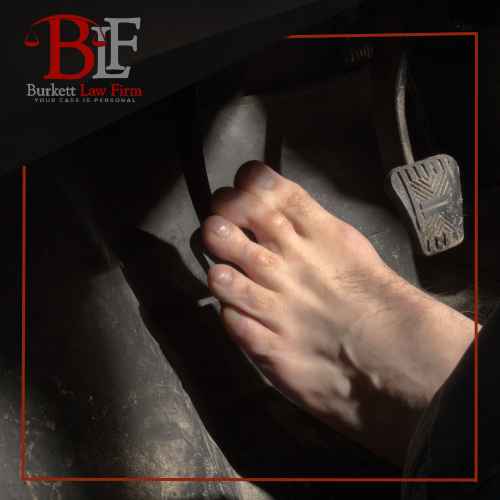
Being involved in a car accident is a stressful experience that no one wants to go through. While assessing immediate injuries is crucial, some injuries may not show symptoms until days or weeks after the accident.
If you’re in Texas and are in such a situation, consulting a car accident attorney is essential for your well-being and any subsequent legal action you wish to pursue. At The Burkett Law Firm, we can help you get the medical attention and treatment you need and seek car accident compensation on your behalf. The first step is to contact our office to schedule a free consultation.
Immediate Medical Attention Is Not Always Enough
After a car accident, it’s standard procedure to seek immediate medical attention. The paramedics on the scene or the emergency room staff will evaluate obvious injuries like fractures, cuts, or concussions.
However, not all injuries make their presence known right away. In 2022, an accident was reported every 57 seconds somewhere in Texas. Because many accidents occur in a day, some medical workers do not go beyond the obvious injuries when evaluating a victim. This can leave injuries hidden and untreated.
Common Hidden Injuries After a Car Accident
Knowing common hidden injuries after a car accident will help you stay safe and know if additional medical treatment is needed if you are in this situation. Some common hidden injuries include the following:
Soft Tissue Injuries
Soft tissue injuries are the most common injury that may not show symptoms immediately. These include sprains, strains, and whiplash.
Symptoms like soreness, stiffness, and pain might start a few days after the accident. In Texas, a car accident attorney can help you collect medical records and documentation that prove the delayed onset of your soft tissue injuries, which is crucial when seeking compensation.
Traumatic Brain Injuries (TBIs)
While concussions are usually diagnosed quickly, other traumatic brain injuries might not present immediate symptoms. You may experience headaches, memory loss, or changes in behavior days or even weeks after the accident.
Texas law allows two years to file a personal injury claim. While you may not have to take legal action immediately, it is beneficial to do so, and gives you plenty of time to gather evidence to prove your case.
Internal Bleeding
Internal bleeding can be life-threatening but often shows no immediate symptoms. Feeling fatigued, dizzy, or experiencing abdominal pain a few days after the accident should prompt immediate medical attention.
Emotional and Psychological Trauma
Texas law recognizes emotional and psychological injuries as compensable in personal injury cases. Symptoms like anxiety, depression, or post-traumatic stress disorder (PTSD) might not appear until after the incident.
Legal Steps to Take After Experiencing Delayed Injuries from a Car Accident
Navigating the legal complexities following a car accident in Texas can be challenging, particularly when injuries are not immediately apparent. Following these legal steps is crucial if you’re dealing with delayed onset injuries.
Seek Medical Attention and Document Everything
If you notice symptoms of an injury days or weeks after the accident, seek medical attention immediately. Medical documentation is vital for establishing the timing and cause of your injuries. Keep records of all medical visits, diagnostic tests, and treatments.
This evidence is crucial when making a personal injury claim, and your car accident attorney will use it when negotiating with insurance companies or presenting your case in court.
Consult a Car Accident Attorney
Texas’s statute of limitations for filing a personal injury claim is two years from the accident date. However, if you discover injuries later, consult a car accident attorney as soon as possible. An experienced attorney can help you navigate the intricacies of Texas law, ensuring that your case is well-documented and filed on time.
Gather Additional Evidence
Photographs, eyewitness accounts, and police reports from the accident scene can all help corroborate your case. If available, obtain video footage from traffic cameras or nearby businesses. Your car accident attorney can help you gather this evidence, particularly crucial in Texas due to its comparative negligence laws. These laws may reduce your compensation based on your percentage of fault in the accident.
File Your Personal Injury Claim
Once you have sufficient evidence and legal advice, the next step is to file your personal injury claim. Your car accident attorney usually sends a demand letter to the insurance company outlining your injuries, medical expenses, and other damages. The negotiation phase follows, where your attorney will strive to get you the best possible settlement.
Prepare for Possible Litigation
If negotiations don’t lead to a satisfactory settlement, be prepared to take your case to court. Your car accident attorney will handle the filing process and represent you during the trial to secure the compensation you deserve.
By following these steps and consulting a qualified car accident attorney, you’ll be well-equipped to navigate the complexities of Texas law and secure compensation for your delayed onset injuries.
Let Our Car Accident Lawyers Help with Your Case
After a car accident, immediate injuries are often easier to detect and treat than those with delayed symptoms. It is essential to remain vigilant for days or weeks following an accident for any signs of injuries that weren’t apparent initially.
In Texas, securing the services of a qualified car accident attorney is crucial for navigating the complexities of the state’s laws on personal injury claims, ensuring that you receive the compensation you rightfully deserve.
At The Burkett Law Firm, we can help with your car accident claim. When you call our office, you can feel confident we will begin the investigation immediately to help you get the full compensation you deserve.





